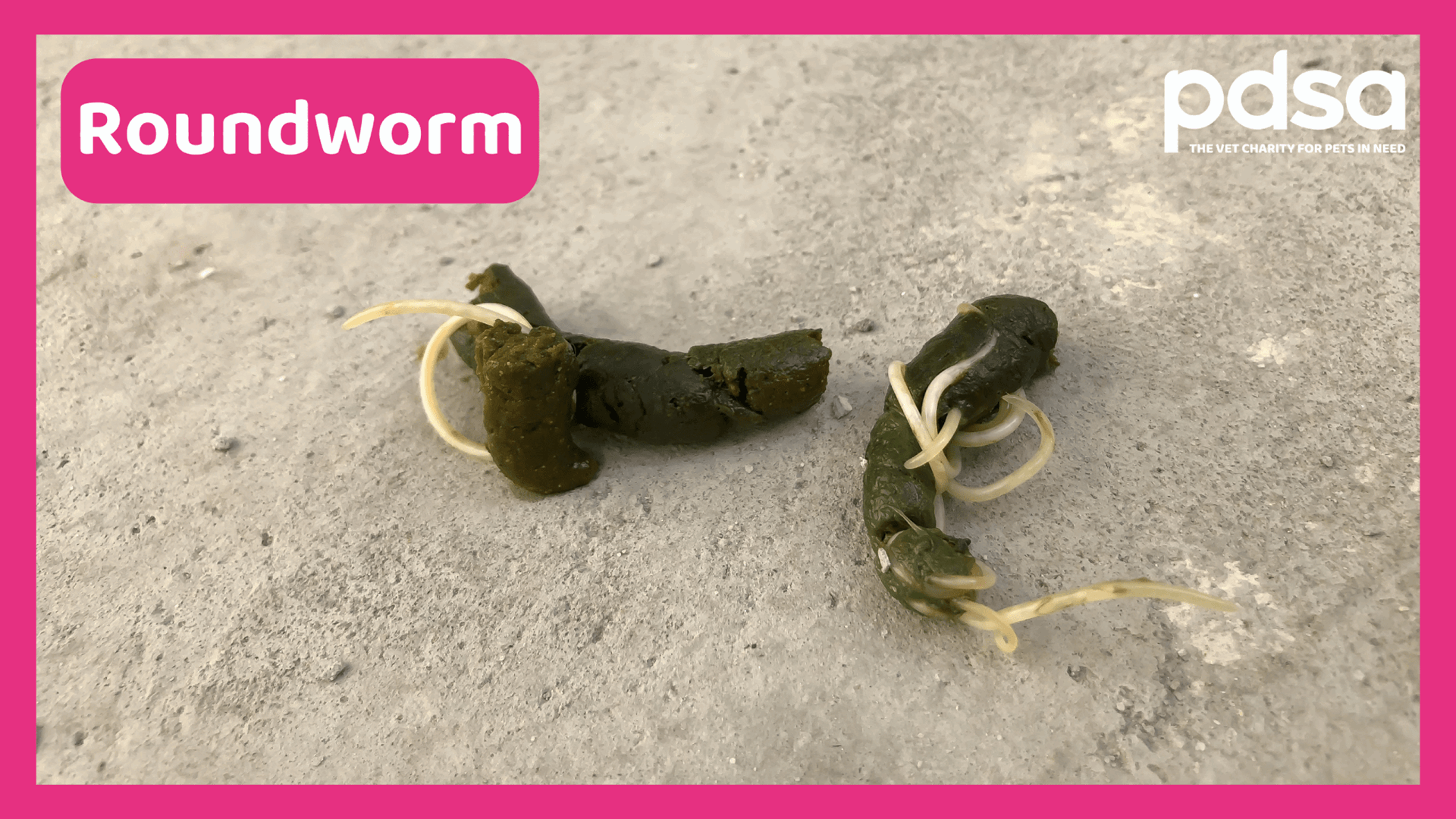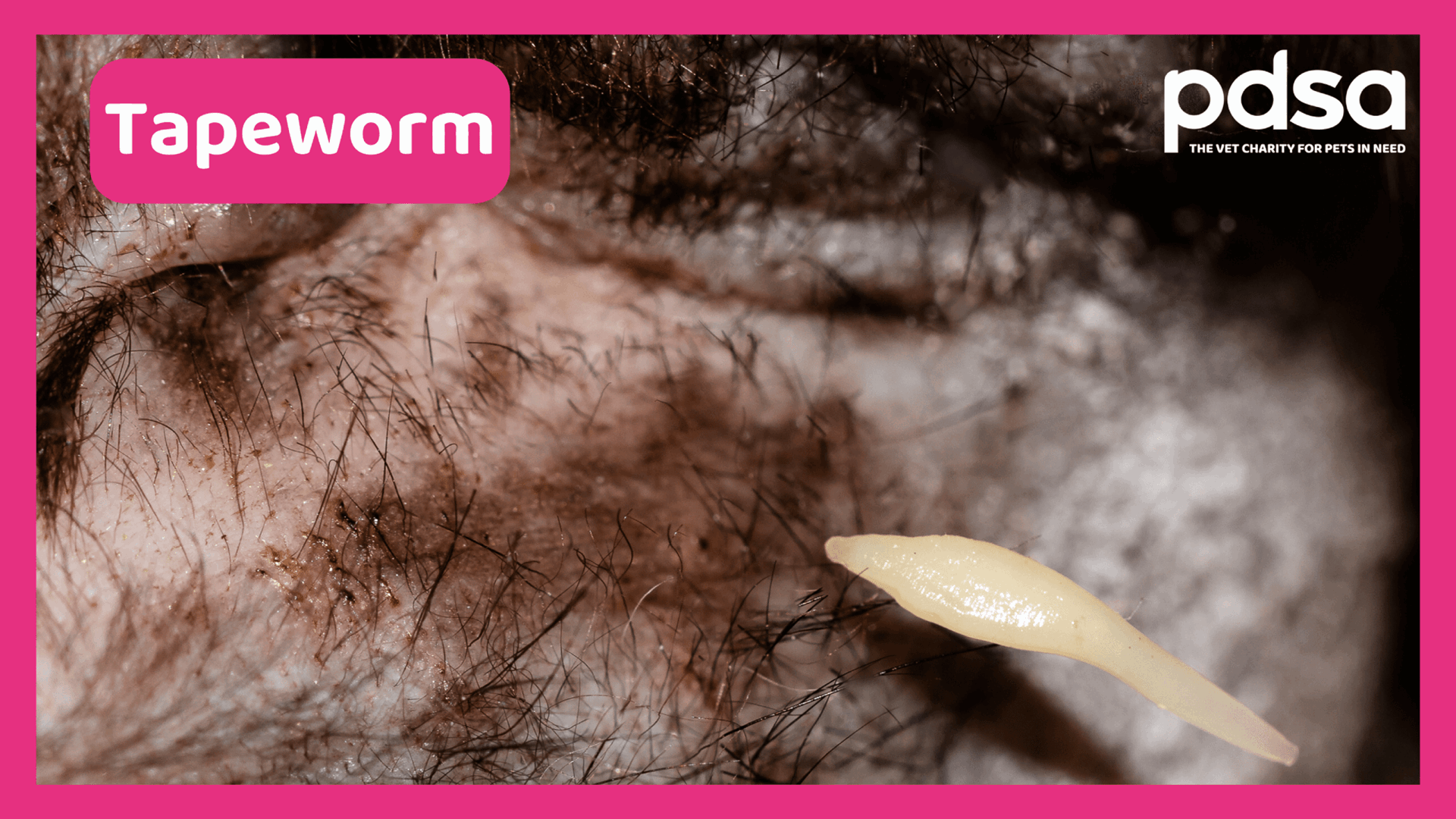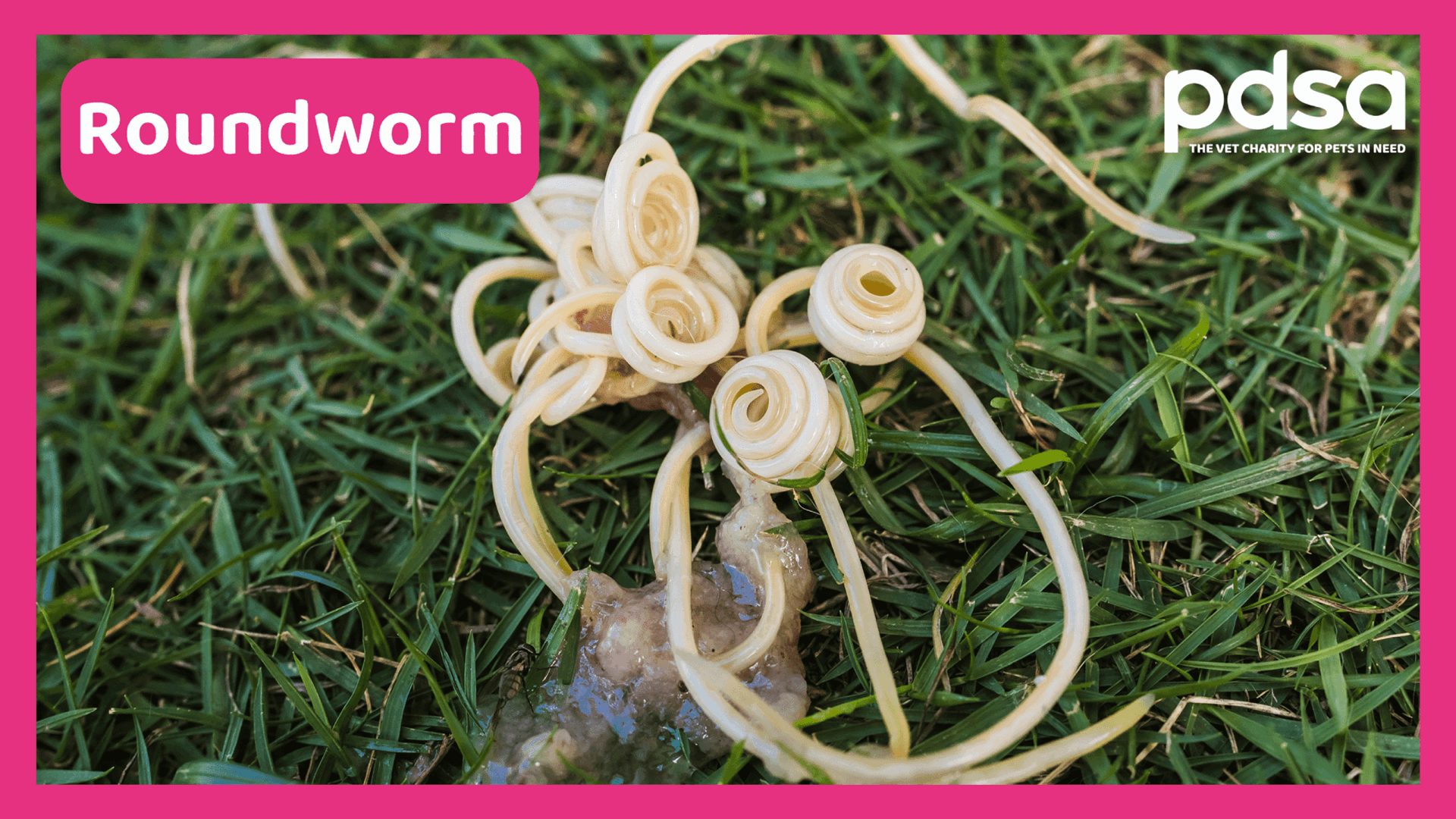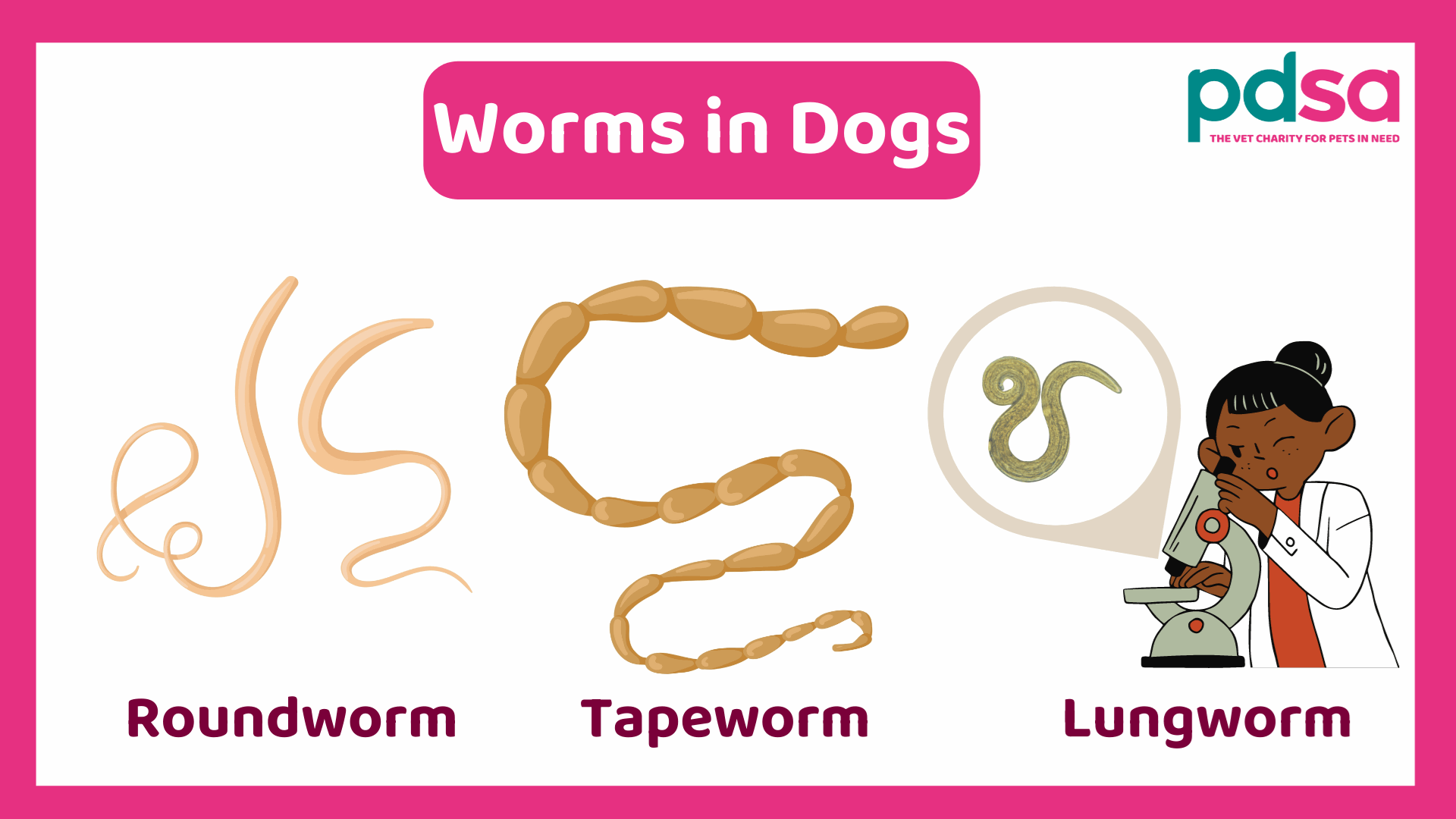Worms in dogs
Overview
- Worms are parasites that live inside the body.
- There are many types of worm that affect dogs in the UK – the most common are roundworm, tapeworm, and lungworm.
- Roundworm and tapeworm both live in the guts – they don’t usually cause serious problems in adult dogs, but can make puppies very poorly. Some roundworms can also affect humans.
- Lungworm is a growing problem around the UK and causes very serious illness in both adult dogs and puppies. Read more about lungworm here.
- It’s important to deworm your dog regularly using an effective wormer.
 Video found at youtu.be/NLybFdvb9Go
Video found at youtu.be/NLybFdvb9Go
Some of the most common UK worms in dogs include:
Roundworm
- Roundworm live in the intestines (guts), rarely cause serious illness in adult dogs, but can cause very serious problems for puppies - such as dehydration, gut blockages and even death.
- They look like spaghetti and can grow up to 15cm long. It’s rare to see them, unless a dog is very heavily infested.
- Roundworm ‘Toxocara canis’ can also infect humans and cause an illness called ‘Toxocariasis’ – this is especially risky for children.
Tapeworm
- Tapeworm live in the small intestine, and like roundworm, rarely cause serious illness in adult dogs, but can be more serious for puppies.
- Tapeworm segments shed in poo and look like grains of rice. During heavy infestations, they are visible crawling around the anus (bottom).
- Although it’s rare, certain types of dog tapeworm can cause disease in humans called ‘Echinococcosis’.
Lungworm
- Lungworm is a potentially fatal parasite carried by slugs and snails, and is a growing problem for dogs in the UK.
- A lungworm infection can make a dog seriously unwell and can even cause death.
- This article doesn’t cover lungworm in detail - for more information read our page ‘Lungworm in Dogs’.
Threadworm and Whipworm
- These are both relatively rare in the UK.
How do dogs catch worms?
Roundworm
- Many puppies catch roundworm in the womb (so are born with them), or through their mother’s milk.
- Adult dogs can catch round worm by eating soil, poo, raw meat, animal carcasses, or by licking contaminated objects.
Tapeworm
- Dogs most commonly become infected with tapeworm by eating fleas (usually during grooming), so flea control is an important part of preventing these worms.
- They can also catch them by eating raw meat, rats and mice, or the carcasses of other animals such as sheep.
Symptoms of worms in dogs
Roundworm:
- Weight loss
- Diarrhoea
- Vomiting
- Poor growth in puppies
- Pot-belly and bloating (most common in puppies)
- Life-threatening blockage of the intestines (severe cases)
Tapeworm
- Scooting or excessively licking anus (bottom)
- Weight loss
- Itchy skin due to concurrent fleas
Treatment
Choosing the right wormer
When it comes to choosing a dog wormer, it can be tricky to know where and what to buy. Thankfully, our vets have put together some simple advice to help you:
- Ask your vet/vet nurse which worms to treat your dog for - this will depend on their age, lifestyle and where they live in the UK.
- Buy a prescription wormer that is effective against all the worms you need to treat. Prescription wormers can only be bought from a vet, or an online pharmacy (using a prescription from your vet), but are far more reliable than non-prescription products.
- If for any reason you aren’t able to buy a prescription wormer, and need to use a non-prescription wormer, choose one carefully because they vary a lot.
- There are two main types of non-prescription worming products: ‘NFA-VPS’ products and ‘off the shelf’ products.
- ‘NFA-VPS’ products can only be sold by a specially qualified person who will ask you some questions about your dog (this could be a pharmacist or a specially qualified shop assistant). You can also buy NFA-VPS products online by filling out a form that will be checked by someone before they send the product. ‘NFA-VPS’ products tend to more dependable than ‘off the shelf’ products (but less reliable than prescription products from your vet).
- ‘Off the shelf’ products can be bought without speaking to anyone, or answering any questions about your dog, for example in a supermarket. We don’t advise using ‘off the shelf’ products because they tend to be less reliable than ‘NFA-VPS’ products.
How regularly should I worm my dog?
Puppies
- Worming puppies is essential for the first few months of their life and best done regularly.
- As a general rule, their treatment should be at around three weeks old, and repeated every two - three weeks until they are 16 weeks old. However, check this with your vet because each product has its own treatment frequency guidelines.
- Make sure to use a worming treatment suitable for your puppy’s age and weight.
Adult dogs
- It’s not possible to stop your dog picking up worms completely, but you can prevent any problems developing by worming them regularly - every one to three months is usually enough.
- More frequent worming may be necessary if your dog scavenges or hunts a lot.
- Remember to protect your dog against lungworm as well as intestinal (gut) worms.
Dosage
- The appropriate dose of wormer for your dog will depend on their age and weight.
- Check out our video on ‘How to weigh your dog at home’.
What to expect after treating your dog for worms
- It’s likely that you won’t see anything after treating your dog for worms - unless they had a particularly heavy infestation, in which case you may see dead worms in their poo.
- Contact your vet if your dog seems unwell or has diarrhoea after a worming tablet.
 Video found at youtu.be/A4v4f1_s-xQ
Video found at youtu.be/A4v4f1_s-xQ
When to contact your vet
If your dog is healthy and simply needs a worming tablet, call your veterinary practice for advice. If they seem unwell, request an appointment - it may help to bring a sample of their poo (or a photograph) to show your vet.
When you welcome a new dog into your life, consider getting dog insurance straight away before any signs of illness start. This will give you peace of mind that you have some financial support if they ever get sick.
Can humans catch worms from dogs?
Yes, although it’s rare, humans can catch certain worms from dogs. Eggs from the roundworm Toxocara canis, can remain in the ground for many years and infect humans if they accidentally get them on their hands and swallow them. Most people that swallow Toxocara eggs don’t get poorly, but in rare cases they can cause illness by travelling to organs such as the liver, heart, brain and eyes. Young children are most at risk, especially if they have a family dog that isn’t wormed regularly, or play in parks where un-wormed dogs have been. This is why it’s so important to worm your dog regularly with an effective product, and always clean up their poo. Read more about toxocariasis on the NHS website.
Are there any home remedies for worms in dogs?
No, to treat worms, you need to use a product with proven ingredients – home remedies are very unlikely to work.
Published: July 2023
Did you find this page useful?
Tell us more
Please note, our vets and nurses are unable to respond to questions via this form. If you are concerned about your pet’s health, please contact your vet directly.
Thank you for your feedback
Want to hear more about PDSA and get pet care tips from our vet experts?
Sign up to our e-newsletter
Written by vets and vet nurses. This advice is for UK pets only. Illustrations by Samantha Elmhurst.





